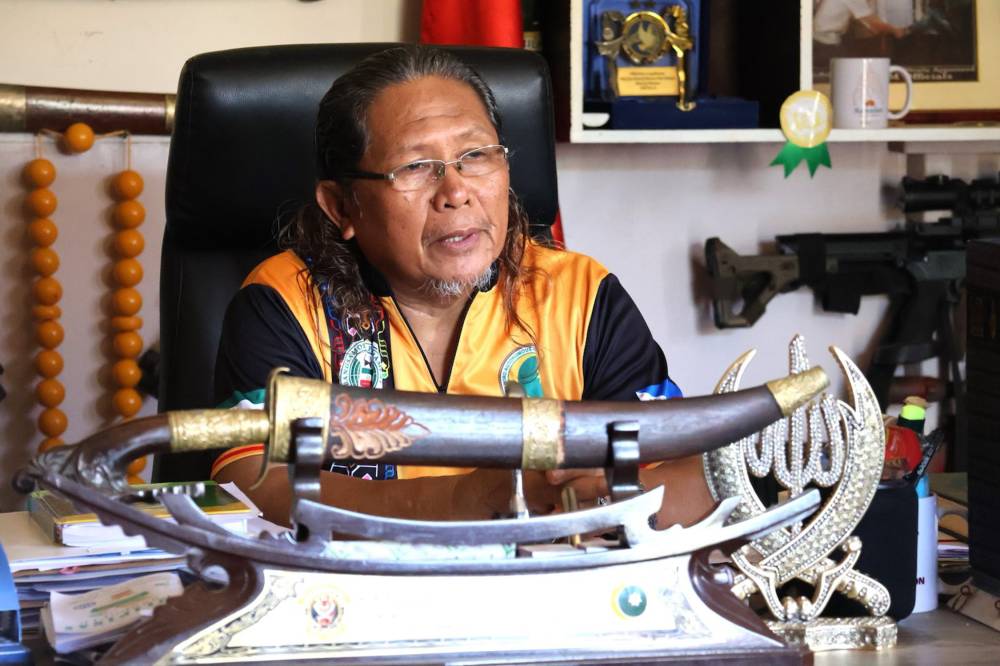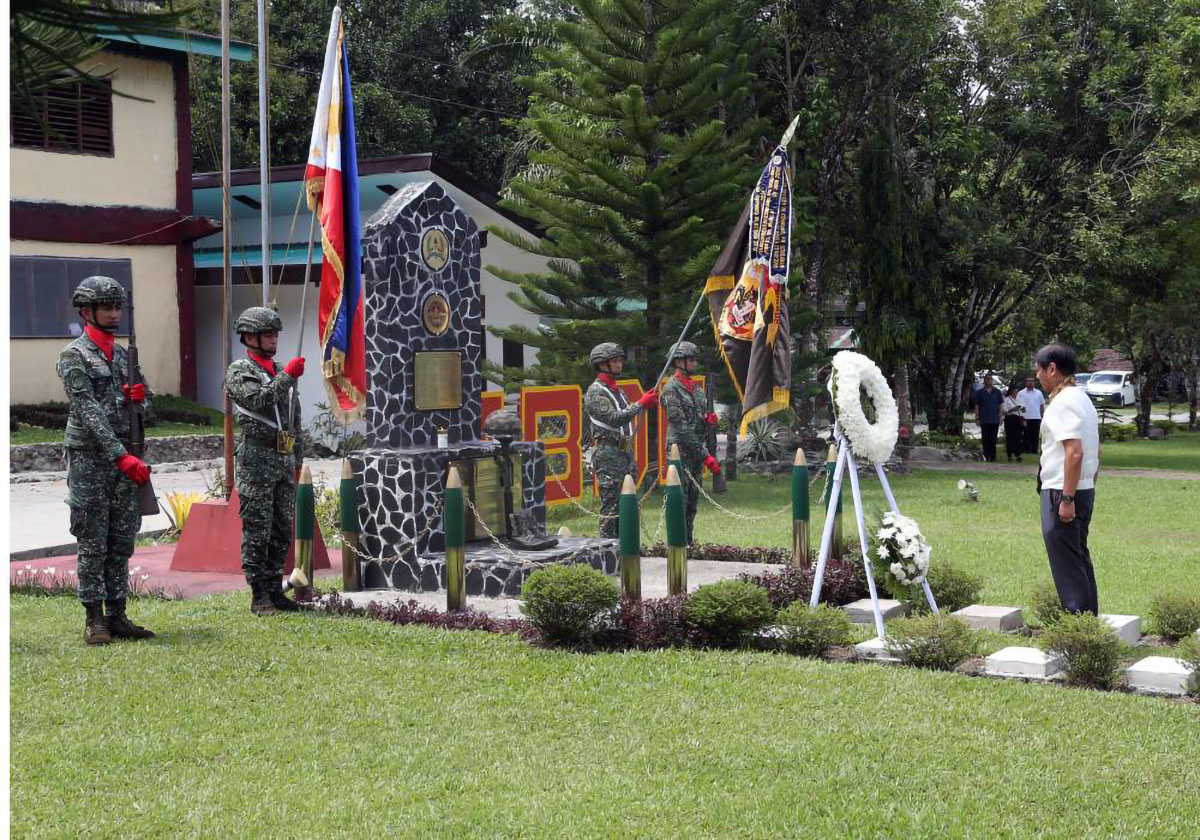From the Philippine Daily Inquirer (Jun 1, 2024): SPECIAL REPORT\\\The Peacemakers: Showtime for former child warrior (By: Fernando del Mundo)

REBUILDING Abdullah Macapaar, also known as “Commander Bravo” of the Moro Islamic Liberation Front, says he is now a “man of peace.” He serves as member of parliament in the interim Bangsamoro government. —ZUHAIRA MANGANSAKAN/BDA
(First of a series)
CAMP BILAL, Lanao del Norte—Abdullah Macapaar’s Shangri-la is taking shape in his former forested battlefield.
On its terraced mountainsides stand schools, social halls, a well-staffed medical clinic, training centers, a fish pond, a vegetable garden and towering falkatas swaying in the wind.
Centerpiece of the facility is a parade ground, patterned after the Philippine Military Academy that Macapaar, known as “Commander Bravo” in the Moro Islamic Liberation Front, had visited.
On weekends, cyclists race on concrete roads to the top, where promenaders roam.
Convention halls, livelihood training centers, more school buildings and dormitories, and a playground for children are on the drawing boards.
“Before there was no road here,” Bravo said.
But as the government and the Moro Islamic Liberation Front began negotiations to end a bloody conflict and initiate development as a vehicle for peace, Bravo began to rebuild.‘A man of peace’
Community and Family Services International (CFSI), a Philippine-based humanitarian organization, and the Bangsamoro Development Agency (BDA) helped in the process with support from various partners, including the World Bank.
“It was a struggle. I had to keep my focus,” said Bravo, juggling a role as an Moro Islamic Liberation Front commander and a member of parliament in the interim Bangsamoro government.
Camp Bilal now serves as a showcase in the recovery and reconstruction program.
“I was a child warrior,” he said in an interview in his office where half a dozen of his high-powered firearms were on display on a wall behind him. “Now I am a man of peace.”
Bravo remembered that as a 7-year-old, his father, a Maranao sultan, had led him to repel an attack by the Ilagas, a paramilitary group seeking to drive indigenous peoples from their ancestral lands, sparking the Moro rebellion.
On his declaration of martial law in 1972, President Ferdinand Marcos Sr. sent troops to disarm combatants. War simmered, culminating in President Joseph Estrada’s “all-out war” against the Moro Islamic Liberation Front in 2000.
Estrada was ousted the following year and his successor, Gloria Macapagal-Arroyo, began for the first time to negotiate peace with the Moro Islamic Liberation Front.
A peace agreement was formally signed in March 2014 and the government and the Moro Islamic Liberation Front mounted a recovery and development program.
Specifically targeted were six acknowledged Moro Islamic Liberation Front camps—Bilal, Abubakar, Badre, Omar, Rajamuda and Bushra—embracing largely agricultural and forestlands in six provinces.
Funding came from the government and a $38-million Mindanao Trust Fund (MTF), financed by international development partners and administered by the World Bank.

A DECADE HENCE President Marcos leads a ceremony at the Marine headquarters in Barira,Maguindanao del Norte, on April 29 marking the 10th anniversary of the signing of the Comprehensive Agreement on the Bangsamoro. —RENE DILAN/PPA POOL
Political realignments
Between 2006 and 2017, the MTF supported socioeconomic activities, health services and access to education, benefiting 638,000 people, 52 percent of whom were women. Additionally, MTF benefited 55,000 people in 2018-2020 and 39,000 in 2020-2021.
Bravo’s core bailiwick is way ahead in development, compared with the five other camps.
For example, the heart of Camp Badre in Maguindanao del Sur remains largely rough mountain terrain.
Last year, a $4-million Bangsamoro Camp Transformation Project (BCTP) was launched to improve access to socioeconomic services and basic infrastructure in the six Moro Islamic Liberation Front camps. Implemented by CFSI and BDA, the BCTP was funded by the Bangsamoro Normalization Trust Fund, a new funding facility administered by the World Bank.
Between 2006 and 2017, the MTF supported socioeconomic activities, health services and access to education, benefiting 638,000 people, 52 percent of whom were women. Additionally, MTF benefited 55,000 people in 2018-2020 and 39,000 in 2020-2021.
Bravo’s core bailiwick is way ahead in development, compared with the five other camps.
For example, the heart of Camp Badre in Maguindanao del Sur remains largely rough mountain terrain.
Last year, a $4-million Bangsamoro Camp Transformation Project (BCTP) was launched to improve access to socioeconomic services and basic infrastructure in the six Moro Islamic Liberation Front camps. Implemented by CFSI and BDA, the BCTP was funded by the Bangsamoro Normalization Trust Fund, a new funding facility administered by the World Bank.
On the 10th anniversary of the signing of the Comprehensive Agreement on the Bangsamoro, President Ferdinand Marcos Jr. traveled to Camp Abubakar in Maguindanao del Norte.
Mr. Marcos rejected calls for the extension of the interim Bangsamoro parliament proposed by Ahod “Al Haj Murad” Ebrahim, its first chief minister, and that elections would be held as scheduled next year to usher in full autonomy.
Realignments have emerged in the ranks of the Moro leaders—some pleading that the interim arrangement remain, saying not all the conditions for the holding of a regular government have been met.
This includes the decommissioning of 40,000 combatants, each promised P1 million in cash and kind. As of August 2023, some 26,000 of them have each received P100,000 and other assistance.
Ali Salik, 76, a member of the Bangsamoro parliament’s central committee, remains upbeat despite an apparent air of uncertainty from the upcoming political exercise.
“Almost 85 percent of the political objectives have been met,” said Salik. “Normalization remains slow, but the government is pushing the momentum faster,” said Salik, called the “maestro.”
“Our problem is Moro between Moro,” he said. “Sometimes, the problem is fighting over land. The population is growing, the space is becoming smaller and smaller.”
Peace is irreversible
Salik said Ebrahim has remained true to the leadership guideposts laid down by the late Hashim Salamat, the Egyptian-educated cleric who broke away from Nur Misuari’s Moro National Liberation Front and formed the Moro Islamic Liberation Front.
“There is no difference,” said Salik, a schoolteacher who fought alongside Salamat and Ebrahim.
“He follows Ustadz Salamat,” Bravo agreed of Ebrahim. Bravo had escaped to Riyadh during the Estrada campaign and studied Islam while working as a taxi driver. He came under the influence of Salamat in the cleric’s Islamic academy in Pakistan and went on to Afghanistan to join the Mujahideen war against the Soviet occupation forces.
Back home, he took over the leadership of the Moro Islamic Liberation Front northwestern front, taking over from his brother, “Commander James Bond.”
Bravo said that if the government continued its development programs, “peace may be irreversible.”(The writer is a former reporter and aid worker who has been assigned in conflict zones in Asia, Africa, the Balkans and the Middle East.)
https://newsinfo.inquirer.net/1947128/the-peacemakers-showtime-for-former-child-warrior

No comments:
Post a Comment
Note: Only a member of this blog may post a comment.